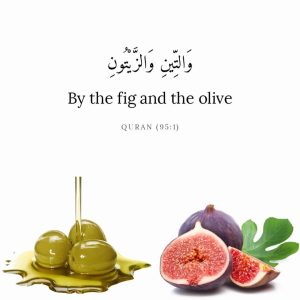1. Fig mentioned in Quran
Fig is a sacred fruit because it is mentioned in the Quran and not only this, Allah SWT swears by the fig in starting of Surah Teen.
وَالتِّينِ وَالزَّيْتُونِ – التين: 1
[I swear] by the fig and the olive. (Quran, 95:1)

The reference to the fig in the first verse of Surat at-Tin is a wisest one in terms of the benefits imparted by this fruit.
2. History of Fig
Figs can trace their history back to the earliest of times with mentions in the Bible and other ancient writings. They are thought to have been first cultivated in Egypt. According to historians, the ancient Crete was second place on the Earth where figs were cultivated. In the 9th century, BC figs were in the diets of Greek people and it became their staple food.
Figs were held in such esteem by the Greeks that they were forbidden by law to export to other parts of the world. Figs were also revered in ancient Rome where they were treated as sacred fruit. At least 29 varieties of figs were already known to humans during this period.
3. Worldwide use of Figs
Fig fruit tree is native to the regions with moderate and temperate climates such as Asia Minor or Turkey. In today’s world, it is grown as an important fruit of commerce in the eastern Mediterranean region, the USA, and Spain.
However, it is also planted by people around the world in their home gardens. During its season figs tree bears several hundreds of pear-shaped fruits twice a year, which vary in size and color depending on the variety.
4. Nutrients in Figs
4.1 Fresh Figs
Fresh figs, especially black mission, are good in poly-phenolic flavonoid antioxidants such as carotenes, lutein, tannins, chlorogenic acid…etc. Their anti-oxidant value is comparable to that of apples at 3200 umol/100 g (Trolex equivalents).
4.2 Dried Figs
Dried figs are an excellent source of minerals, vitamins, and anti-oxidants. In fact, dried fruits are higher concentrated sources of energy, minerals, and vitamins. 100 g dried figs provide 249 calories.
Dried figs are an excellent source of minerals like calcium, copper, potassium, manganese, iron, selenium, and zinc. 100 g of dried figs contains 680 mg of potassium, 162 mg of calcium, and 2.03 mg of iron.
5. Health Benefits of Figs
5.1 Save from diseases and infections
Fresh figs are known for adequate levels of e anti-oxidant vitamins such as vitamin A, E, and K. Altogether these phytochemical compounds in the fig fruit help to eliminate harmful oxygen-derived free radicals from the body and thereby protect us from various diseases such as cancers, diabetes, degenerative diseases, and other infections.
5.2 For diabetic patients
Research studies suggest that chlorogenic acid in them help lower blood sugar levels and control blood-glucose levels in type-II diabetes mellitus condition.
5.3 Benefits for heart
Potassium found in figs is an important component of cell and body fluids that helps controlling heart rate and blood pressure.
6. References
- Hamid Farhangi, Maryam Ajilian, Masumeh Saeidi, Gholam Hasan Khodaei – Medicinal Fruits in Holy Quran
- Cho E, Seddon JM, Rosner B, Willett WC, Hankinson SE. A prospective study of intake of fruits, vegetables, vitamins, and carotenoids and risk of age-related maculopathy. Arch Ophthalmol 2004 Jun;122(6):883-92
- Appel LJ, Moore TJ, Obarzanek E, Vollmer WM, Svetkey LP, Sacks FM, et al. A clinical trial of the effects of dietary patterns on blood pressure. DASH Collaborative Research Group. N Engl J Med 1997;336(16):1117-24.
- Shanahan M, Compton SG, So Samson, Corlett R. Fig-eating by vertebrate frugivores: a global review. Biological Reviews 2001; 76(4): 529–72.


